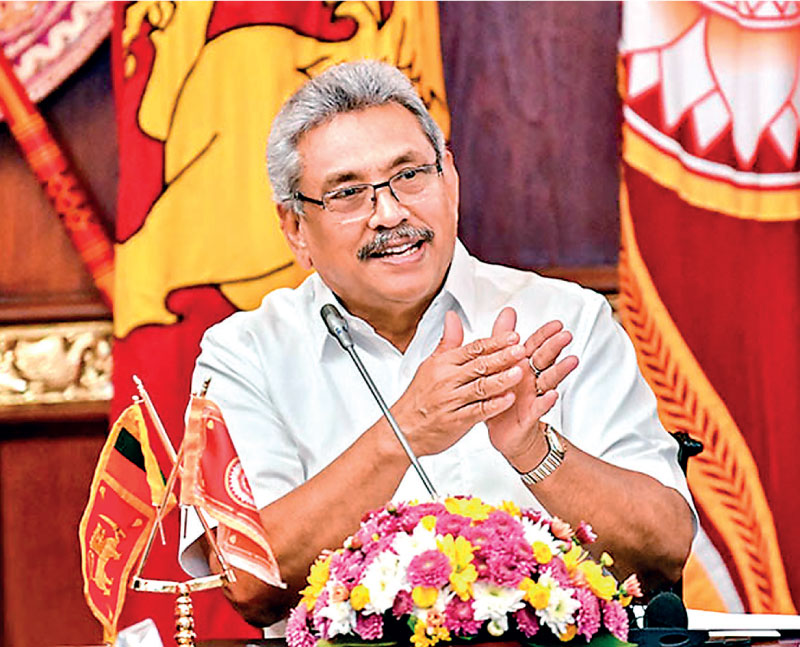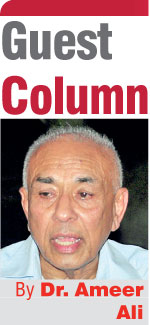Monday Feb 16, 2026
Monday Feb 16, 2026
Monday, 21 March 2022 00:09 - - {{hitsCtrl.values.hits}}

President Gotabaya Rajapaksa
 In his address to the nation, President Gotabaya Rajapaksa (GR), was reported to have “disowned responsibility for the current crisis” (FT), although according to another source, he accepted responsibility for “his actions” and was determined to take “tough decisions” (TM). Prime Minister Mahinda Rajapaksa (MR) too claimed no responsibility for the crisis. Whether they accepted responsibility or not, the fact remains that in the all-powerful executive presidency created by the 20th Amendment, which reduced the powers of the parliament and turned it into a “post box”, the ultimate blame should fall on the President.
In his address to the nation, President Gotabaya Rajapaksa (GR), was reported to have “disowned responsibility for the current crisis” (FT), although according to another source, he accepted responsibility for “his actions” and was determined to take “tough decisions” (TM). Prime Minister Mahinda Rajapaksa (MR) too claimed no responsibility for the crisis. Whether they accepted responsibility or not, the fact remains that in the all-powerful executive presidency created by the 20th Amendment, which reduced the powers of the parliament and turned it into a “post box”, the ultimate blame should fall on the President.
Reasons are too many reasons to enumerate. For example, it was GR who handpicked and appointed a hierarchy of public officials and it was he who gave the final approval to all their decisions and actions. It was GR who virtually commandeered the Central Bank with his chosen governors and members of monetary board, and demanded them to assist in implementing HIS economic policies. It was he who decided on what taxes to be reduced and what imports to be allowed. The ban on imports of palm oil and chemical fertiliser, two crucial inputs, was entirely his decision. The so-called home-grown solution by way of providing liquidity with little concern about inflation was also devised to back GR’s alternate way to enjoy “prosperity and splendour”. The list could go on ad infinitum. Shouldn’t the President be made accountable to the chaos these decisions caused?
For almost one year, as the economic and financial crises continued to worsen, and as the regime was desperately searching for short-term relief by way of borrowings from and currency swaps with friendly countries, a number of independent economists and members from the Opposition were entreating the Government to approach IMF without delay and work for an orderly reschedule of the country’s debt. Had that advice been heeded, the cost of rescheduling and the pain of adjustment would have been a lot cheaper and milder respectively. But an obstinate hierarchy of bureaucrats in collusion with an equally mulish President, backed by his Viyathmaga, were convinced that GR’s alternate path would lead to the desired destiny without IMF tutelage.
The Central Bank (CB), first under an economist and then under an accountant chose to ignore the alarm bells sounded by the community of international monitors that included the World Bank, IMF and reputed Credit Rating Agencies, and stuck to their home-grown strategy. In fact, the CB chiefs treated those warnings as irresponsible, inconsiderate and even conspiratorial.
Besides, there is also an anti-IMF lobby within Sri Lanka’s political community, which has its own representatives within the ruling coalition. This lobby still refuses to come to terms with the fact that since 1977 the country’s economy had been drawn into the vortex of a highly integrated, globalised and financialised neo-liberal economic order. It is true that this order operates more to the advantage of the rich and powerful than to the poor and weak. But the system has certain institutional arrangements to guide and assist weaker economies that go off the track because of mismanagement and incompetency. The task of those institutions is to make these economies get back on the track, regain their competitive strength and move on. IMF is one such institution.
Unfortunately, the anti-IMF lobby views that institution as an icon of Western dominance if not outright imperialism, the lingering vestiges of yesterday’s Cold War. Whether GR fell prey to this anti-IMF ideology or not, his alternate path to development as well as the so-called home-grown solution manufactured with assistance from CB are both in tatters. He has finally realised that there is no alternative but to seek IMF help.
But, will that be possible without throwing out the anti-IMF lobby from the coalition, and with a CB Governor who had been adamant that Sri Lanka should not go to the IMF? There was a rumour that the chief had been asked to step down, but it was denied later. Even if he were to retain his position would he have the commitment and dedication to see the IMF remedy succeed? Isn’t there a clash of interests here?
Be that as it may, an orderly rescheduling of debt via the IMF is no doubt an absolute necessity to prevent total collapse of the economy. Even the most recent agreement with India for $ 1 billion injection, the details of which are hidden from the public as usual, must have been contingent upon the fact that Sri Lanka approaches IMF for assistance. That assistance in turn is contingent upon the Government’s willingness to undertake implementing IMF recommendations to raise taxes and reduce expenditure, to tighten the monetary policy, to float the rupee, and above all, to clean up corruption and introduce structural reforms to make public corporations profitable. The Sri Lankan Airline and the Petroleum Corporation would come under close scrutiny for reforming.
The last two recommendations are the toughest to implement by a regime whose political survival depends on tolerating corruption and writing off losses incurred by parastatals. GR’s resolve to take tough decisions would be tested in this area. In any case, the cost of delayed reparation is going to be painful, but the negotiators should at least be able to work out a safety net to protect the poorer sections of the citizenry who had sacrificed enough during the last two years. They should not be asked to tighten their belts any more.
Ultimately, the long-term solvency of Sri Lanka depends on increasing production and earning surpluses. It is that surplus, which would free the country from all foreign debt. The greatest challenge facing the country now is to produce this surplus. The failure in this regard has a history of more than seven decades. One fundamental reason for this failure was the growth of ethno-nationalism that still bedevils the country. After all, an economy is built basically by and for the people. People are the most valuable asset to any economy. It is their active participation in production, consumption and exchange that make an economy grow.
Within Sri Lanka’s neighbourhood, Bangladesh is a shining example to illustrate this point. Bangladesh is a latecomer to the economic growth scene. That country did not even exist when Sri Lanka became independent, and when Bangladesh was born in 1971, it was a typical basket case of under-development. Today with 163 million people that nation has become a surplus producer and a lender to Sri Lanka. How did this happen? Its growth secret, according to several economists, lies in optimising the utilisation of its main asset, population.
GR had been ignorant of this fact. Over the last two years since he became president, he and his regime had been practically ruling for the benefit of only two-third of the population and deliberately ignored the interest of the rest. His assumption was that when prosperity and splendour return, the other one-third would automatically be attracted into his Valhalla. On that assumption, the founding father of Singapore, Lee Kwan Yew, could have easily ignored the Indians and Malays in that country and built Singapore entirely with the support of the Chinese and in their interest. But he had the foresight to realise the danger inherent in that strategy and kept Chinese ethno-nationalism at bay. How he had succeeded and turned Singapore from a Third World country into a First World country is another illustration of optimum utilisation of population.
Will the President, having been instrumental in producing the prevailing calamity, at least now discard his Sinhala-Buddhist chauvinism and take the whole country under his fold and start rebuilding the economy and polity? It is a tough task, but he promised to take hard decisions. Would this be one of them? Needless to remind again that the buck stops with the President.
(The writer is attached to the School of Business and Governance, Murdoch University, Western Australia.)